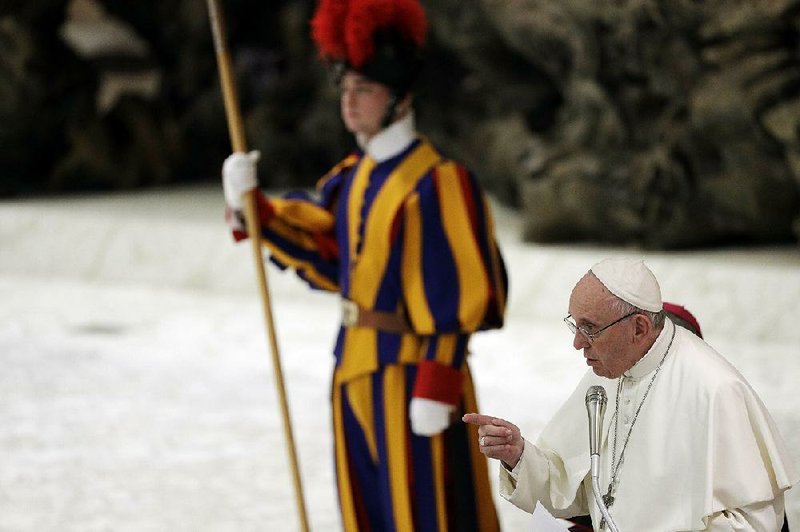VATICAN CITY -- Pope Francis is preparing to convene an unprecedented conference on sex abuse this month, widely viewed as among the most pivotal moments of his papacy, but the Vatican is cautioning not to expect too much.
"I permit myself to say that I've perceived a bit of an inflated expectation," Francis said. "We need to deflate the expectations."
The Holy See's press office released a statement calling the meeting just one stage in a 15-year journey.
The pope described his goal as educating bishops on the problem of abuse and how properly to handle it -- which advocates say the church has talked about for years.
Francis called for the meeting while facing a crescendo of sexual abuse scandals across the Catholic world -- cases in which bishops and cardinals are alleged to have enabled abuse or carried it out themselves.
The four-day meeting -- scheduled to begin Feb. 21 and to be attended by the heads of more than 100 national bishops' conferences -- marks the first time a pope has brought together the religion's top leaders to discuss the issue of abuse. It presents an opportunity for Francis to work to repair the church's damaged reputation and demonstrate that it will be more proactive in its effort to eliminate the scourge of abuse.
But the landmark event is a risk for the pontiff and could end up boosting criticism that he is moving too slowly and reluctantly to tackle the Roman Catholic Church's greatest crisis.
Vatican watchers say it is unclear whether the church can emerge from the conference with the kind of concrete policymaking reforms that have long been urged by advocates. Such reforms would include changes in canon law or new mechanisms that aim to hold accountable bishops who cover up abuse.
Speaking to reporters last month, Francis said he intended the event to help bishops become better aware of both the suffering of victims and the "protocols" for dealing with complaints.
Such an outcome could help boost the vigilance of bishops in parts of the world not yet hit by high-profile abuse scandals. But it would qualify as a letdown across parts of Europe and in the United States, where Catholic leaders are well aware of the abuse problem and long ago drew up their own safeguarding policies.
"I think Americans will be disappointed in the meeting," said the Rev. Thomas Reese, a Jesuit priest and a senior analyst at the Religion News Service. "They'll be hearing things that we've been talking about for the last 20 years. But I could see it being a failure for the U.S. church while it's a success for the church in Africa and Asia and Latin America."
Some experts said the pope could take a key step by emphasizing the expectation that clerics who are found guilty of abuse be immediately removed from priestly duties. This "zero tolerance" policy, as it is known, has been ignored by bishops in certain regions.
But advocates argue that the church should be beyond the stage of educating leaders, given that cases of priestly abuse exploded on the world stage almost two decades ago.
Although the conference this month is unprecedented because of the pope's direct involvement, the Vatican seven years ago endorsed and participated in a similar sex abuse-themed meeting at a university in Rome. More than 100 bishops conferences sent representatives. Then-Pope Benedict XVI expressed his support. Vatican higher-ups apologized to victims and talked about eliminating the plague of abuse. Speakers included Archbishop Charles Scicluna and the Rev. Hans Zollner, two of the Vatican figures organizing the 2019 event.
"So the idea that these bishops now have to have awareness first -- duh, that was seven years ago," said Marie Collins, an Irish abuse victim and former member of the pope's commission on sexual abuse. "And obviously that [2012 event] didn't achieve anything. It's Groundhog Day. There's an amnesia."
The Vatican has urged the bishops going to Rome to meet beforehand with survivors of clerical abuse, "to learn first-hand the suffering that they have endured." It also announced the list of people organizing the event. But other details remain undisclosed, including the speakers and topics that will be discussed.
The church has struggled to make progress on preventing sexual abuse in part because its leaders are at odds over the root causes and potential solutions. Bishops are divided on the degree to which a clerical "homosexual culture" is a part of the problem. They disagree on whether lay church members should play a greater role in investigating abuse claims. A portion of bishops still push back against the notion that abuse is a global problem, saying it is instead contained within the Western Church.
"We still hear that," said Monsignor Stephen Rossetti, a priest who spoke at the 2012 event about ways to combat abuse. "Actually, the U.S. is one of the only countries that [follows] a formal zero-tolerance policy. Most don't. And they will learn the hard way. The message would be, 'Save yourself 20 years of pain.'"
A Section on 02/10/2019
